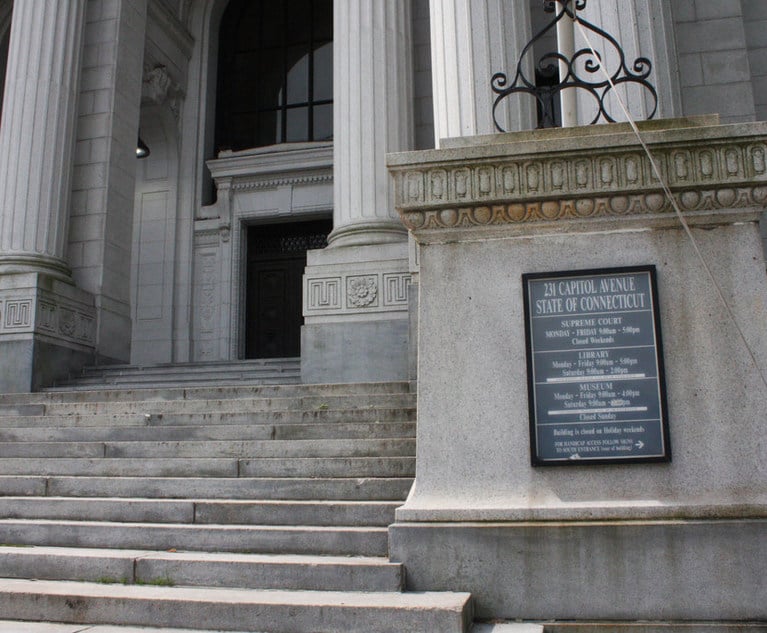Confronting a Legal Profession in Distress
Between 21 and 36 percent of practicing lawyers are problem drinkers. Twenty-eight percent suffer from depression; 19 percent struggle with anxiety; and 23 percent are impaired by stress. Law students fare little better—17 percent are depressed; 14 percent suffer severe anxiety; 6 percent reported suicidal thoughts in the past year; and 22 percent engaged in binge drinking during the year.
December 15, 2017 at 01:14 PM
4 minute read
 Photo: Shutterstock
Photo: Shutterstock Between 21 and 36 percent of practicing lawyers are problem drinkers. Twenty-eight percent suffer from depression; 19 percent struggle with anxiety; and 23 percent are impaired by stress. Law students fare little better—17 percent are depressed; 14 percent suffer severe anxiety; 6 percent reported suicidal thoughts in the past year; and 22 percent engaged in binge drinking during the year.
Those are the dismal results of the 2016 study of 13,000 lawyers by the American Bar Association Commission on Lawyer Assistance Programs and the Hazelden Betty Ford Foundation and a separate Survey of Law Student Well-Being conducted that same year, which included 3,300 law students from 15 different law schools.
The adverse effect such statistics have on the legal profession—including the inability of its members to do their best work, or fully comply with the Rules of Professional Conduct, or even enjoy some semblance of job satisfaction and happiness—is obvious. So with the objective of doing something about that unwanted state of affairs, the ABA, the National Organization of Bar Counsel and the Association of Professional Responsibility Lawyers created the National Task Force on Lawyer Well-Being.
The task force first agreed on a definition of “lawyer well-being” to include emotional health, occupational pursuits, creative or intellectual endeavors, spirituality, physical health and social connection, and then identified “five core steps” necessary to realize a “more sustainable culture.” In a 72-page report just recently released, the task force explored in great detail the importance of: (1) identifying the role each stakeholder can play in addressing the “toxicity” in the legal profession; (2) ending the stigma of reaching out for help; (3) emphasizing that well-being and the lawyer's duty of competence are inextricably intertwined; (4) expanding and enhancing outreach and educational programs; and (5) changing the profession “one small step at a time” (e.g., de-emphasizing alcohol at bar association social events). The task force's elaboration upon those basic concepts in its report is creative, sophisticated and robust—and far beyond the scope of this commentary. Suffice it to say, the report makes fascinating, disconcerting and, yes, hopeful, reading for all who care about our profession.
But what can/should we do beyond perusing the report and bemoaning the condition of the profession it describes? We have all encountered colleagues who suffer from substance abuse, gambling addiction, or depression and anxiety from the day-to-day stress inherent in our professional lives. But that very same pressure—from the courts, clients, partners or otherwise—all too often prevents us from taking the time and making the effort to extend a helping hand to our brother or sister in need—as we know we should. Perhaps the task force's report—and the eye-opening statistics and stark reality it presents, the disheartening conditions it describes and the path to improvement it prescribes—will be the tipping point.
Perhaps now we will assist a colleague to find professional help for the depression that is crippling his ability to perform. Perhaps now we will convince a lawyer, who is so obviously struggling with a drinking problem, to contact Lawyers Concerned for Lawyers or AA or both. Perhaps now, instead of replying to uncivil outbursts with the same and in equal measure, we will engage the lawyer regularly acting out to see if there is an underlying problem that explains her behavior. Perhaps now we will agree to speak to law school classes and newly-admitted lawyer groups to share with them the coping skills we have acquired over many years in the trenches. Perhaps now, at the other end of the timeline, we will undertake to gently convince that older lawyer, who no longer can meet the unyielding demands of practice, that it is time to gracefully leave the stage. Perhaps now we will incorporate well-being courses into the CLE we offer through our bar associations and give MCLE credit for them. Perhaps now we will collaborate with the judiciary and law schools to make lawyer well-being a collaborative, bench-bar-academy undertaking. Perhaps now we will re-examine our Rules of Professional Conduct and their enforcement with a heightened concern for remediating—not just punishing—the impaired lawyer. Perhaps.
This content has been archived. It is available through our partners, LexisNexis® and Bloomberg Law.
To view this content, please continue to their sites.
Not a Lexis Subscriber?
Subscribe Now
Not a Bloomberg Law Subscriber?
Subscribe Now
NOT FOR REPRINT
© 2025 ALM Global, LLC, All Rights Reserved. Request academic re-use from www.copyright.com. All other uses, submit a request to [email protected]. For more information visit Asset & Logo Licensing.
You Might Like
View All
Coerced Confessions and the Burden of Proof Beyond Reasonable Doubt


35 Years After CT's Affordable Housing Act, Progress Remains a Struggle
4 minute readTrending Stories
- 1Uber Files RICO Suit Against Plaintiff-Side Firms Alleging Fraudulent Injury Claims
- 2The Law Firm Disrupted: Scrutinizing the Elephant More Than the Mouse
- 3Inherent Diminished Value Damages Unavailable to 3rd-Party Claimants, Court Says
- 4Pa. Defense Firm Sued by Client Over Ex-Eagles Player's $43.5M Med Mal Win
- 5Losses Mount at Morris Manning, but Departing Ex-Chair Stays Bullish About His Old Firm's Future
Who Got The Work
J. Brugh Lower of Gibbons has entered an appearance for industrial equipment supplier Devco Corporation in a pending trademark infringement lawsuit. The suit, accusing the defendant of selling knock-off Graco products, was filed Dec. 18 in New Jersey District Court by Rivkin Radler on behalf of Graco Inc. and Graco Minnesota. The case, assigned to U.S. District Judge Zahid N. Quraishi, is 3:24-cv-11294, Graco Inc. et al v. Devco Corporation.
Who Got The Work
Rebecca Maller-Stein and Kent A. Yalowitz of Arnold & Porter Kaye Scholer have entered their appearances for Hanaco Venture Capital and its executives, Lior Prosor and David Frankel, in a pending securities lawsuit. The action, filed on Dec. 24 in New York Southern District Court by Zell, Aron & Co. on behalf of Goldeneye Advisors, accuses the defendants of negligently and fraudulently managing the plaintiff's $1 million investment. The case, assigned to U.S. District Judge Vernon S. Broderick, is 1:24-cv-09918, Goldeneye Advisors, LLC v. Hanaco Venture Capital, Ltd. et al.
Who Got The Work
Attorneys from A&O Shearman has stepped in as defense counsel for Toronto-Dominion Bank and other defendants in a pending securities class action. The suit, filed Dec. 11 in New York Southern District Court by Bleichmar Fonti & Auld, accuses the defendants of concealing the bank's 'pervasive' deficiencies in regards to its compliance with the Bank Secrecy Act and the quality of its anti-money laundering controls. The case, assigned to U.S. District Judge Arun Subramanian, is 1:24-cv-09445, Gonzalez v. The Toronto-Dominion Bank et al.
Who Got The Work
Crown Castle International, a Pennsylvania company providing shared communications infrastructure, has turned to Luke D. Wolf of Gordon Rees Scully Mansukhani to fend off a pending breach-of-contract lawsuit. The court action, filed Nov. 25 in Michigan Eastern District Court by Hooper Hathaway PC on behalf of The Town Residences LLC, accuses Crown Castle of failing to transfer approximately $30,000 in utility payments from T-Mobile in breach of a roof-top lease and assignment agreement. The case, assigned to U.S. District Judge Susan K. Declercq, is 2:24-cv-13131, The Town Residences LLC v. T-Mobile US, Inc. et al.
Who Got The Work
Wilfred P. Coronato and Daniel M. Schwartz of McCarter & English have stepped in as defense counsel to Electrolux Home Products Inc. in a pending product liability lawsuit. The court action, filed Nov. 26 in New York Eastern District Court by Poulos Lopiccolo PC and Nagel Rice LLP on behalf of David Stern, alleges that the defendant's refrigerators’ drawers and shelving repeatedly break and fall apart within months after purchase. The case, assigned to U.S. District Judge Joan M. Azrack, is 2:24-cv-08204, Stern v. Electrolux Home Products, Inc.
Featured Firms
Law Offices of Gary Martin Hays & Associates, P.C.
(470) 294-1674
Law Offices of Mark E. Salomone
(857) 444-6468
Smith & Hassler
(713) 739-1250











